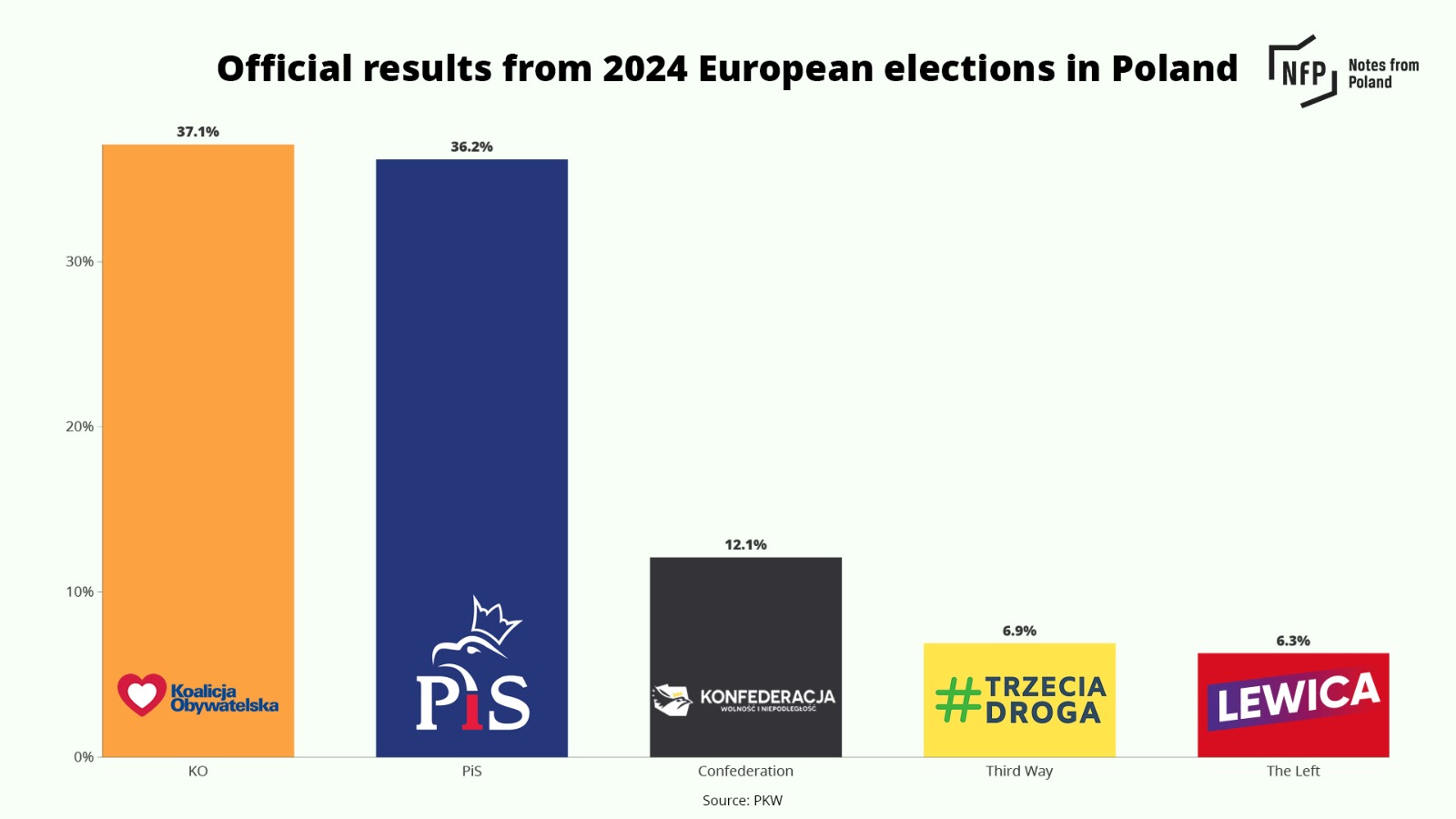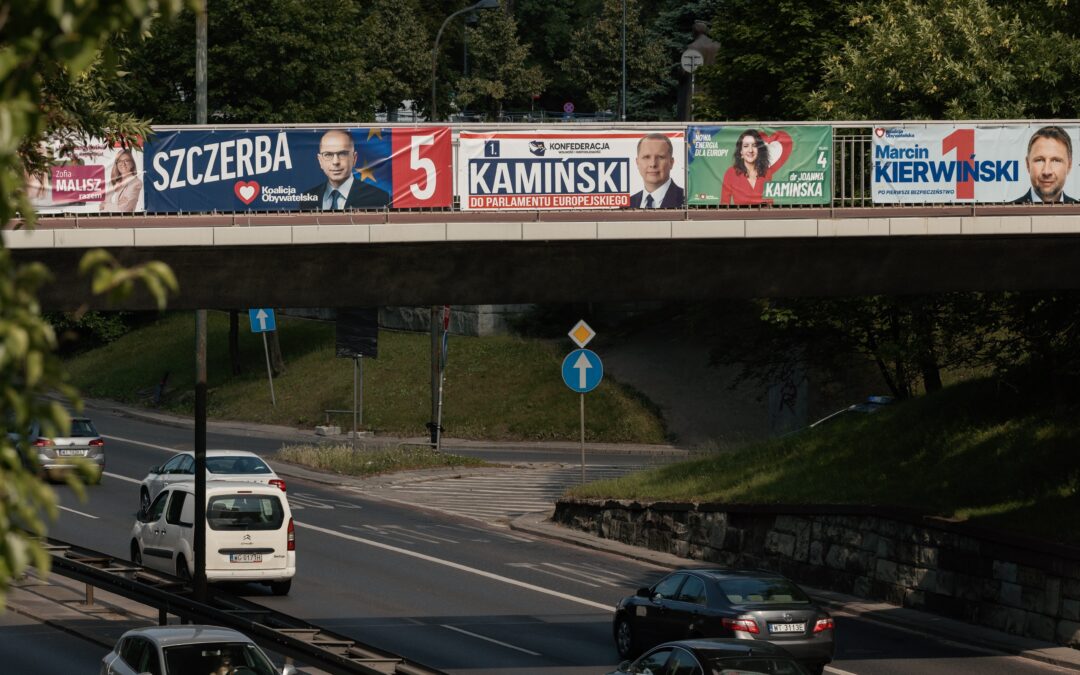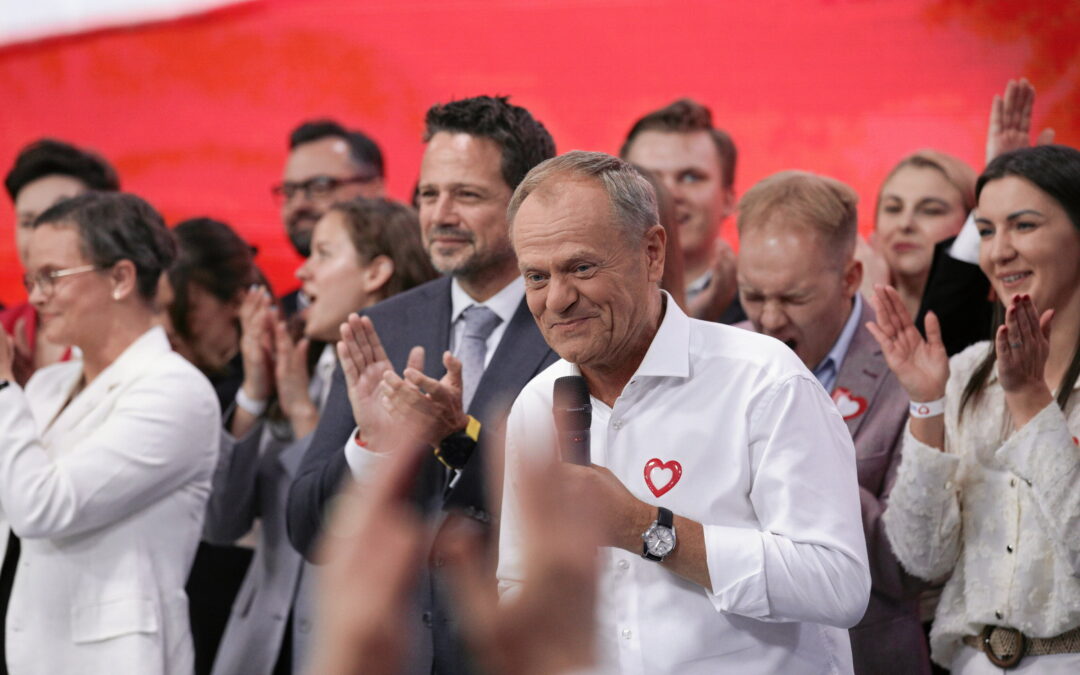By Daniel Tilles
Sunday’s European elections saw Prime Minister Donald Tusk’s centrist Civic Coalition (KO) emerge victorious, taking 37% of the vote ahead of the national-conservative Law and Justice (PiS) on 36%. It was the first time in ten years that PiS has not finished top in a Polish election.
Meanwhile, the far-right Confederation (Konfederacja) surged into third place on 12% while KO’s two coalition partners, the centre-right Third Way (Trzecia Droga) and The Left (Lewica), finished with 7% and 6% respectively.

Our editor-in-chief Daniel Tilles dives deeper into what lies behind the results and what they may mean going forward.
This was not a victory against the right
Given the success of right-wing and far-right parties in many parts of Europe at these elections, some will be keen to present Tusk’s victory as a rare success for the political centre.
That would be an exaggeration at best. KO’s margin of victory against PiS was less than a percentage point. Meanwhile, Confederation surged in support while Third Way collapsed and The Left stagnated.
Overall, the right-wing opposition won a larger share of the vote (48%) than it did in April’s local elections (42%) or October’s parliamentary elections (43%).
Moreover, during its campaign, KO focused on issues that are often the domain of the right, such as border security, military preparedness and opposing illegal migration (which earlier this year Tusk called a threat to “the survival of Western civilisation”).
The “brutal truth” is that the “survival of Western civilisation” depends on preventing “uncontrolled migration”, says Polish Prime Minister @donaldtusk.
"We [must] wake up and understand that we have to protect our borders…[or] our world will collapse" https://t.co/mPwGIMCoU9
— Notes from Poland 🇵🇱 (@notesfrompoland) February 12, 2024
Tusk is swallowing up his coalition partners
When Third Way and The Left entered a government dominated by KO late last year, some commentators warned that, in the long run, they risked being consumed or destroyed by Tusk’s group. While it remains relatively early days for the coalition, these election results appear to bear out those warnings.
Since Tusk’s government took office, Third Way and The Left have struggled for visibility. A combination of holding relatively minor ministries and appointing relatively little-known ministers (with the exception of Władysław Kosiniak-Kamysz at defence) has left them out of the limelight.
The government’s most visible ministers – Adam Bodnar at justice, Radosław Sikorski at foreign affairs, Bartłomiej Sienkiewicz (formerly) at culture – have been from KO.
Meanwhile, although Third Way leader (and former TV presenter) Szymon Hołownia’s polished performances as the new speaker of parliament initially brought much positive attention, interest has inevitably dried up. It is his group in particular that will be deeply disappointed with yesterday’s results, in which it saw the 14% of votes it won at October’s parliamentary elections and April local elections drop now to just 7%.
The Left, meanwhile, continues to struggle to chime with voters. While it is associated above all with what are known in Poland as “worldview” issues – such as abortion and LGBT rights – much of its territory has been snatched by Tusk, who has shifted KO in a more socially liberal direction. That has left The Left unable to win more than 9% of the vote at the last three elections.
Opposition leader @donaldtusk has pledged to simplify the gender-recognition process for trans people and introduce same-sex civil partnerships if he wins next month's elections.
LGBT people are a "victimised minority” in Poland, he says https://t.co/CwQqkVC4rY
— Notes from Poland 🇵🇱 (@notesfrompoland) September 22, 2023
PiS is down but far from out
PiS will be disappointed with the symbolism of failing to come top in an election for the first time in a decade. However, the party should still be fairly happy with a result that sees it almost neck-and-neck with KO.
Indeed, its share of the vote yesterday (36.2%) was higher than at either April’s local elections (34.3%) or October’s parliamentary elections (35.4%).
After PiS lost power last year, some predicted that the party would implode. But its dominant figure, Jarosław Kaczyński, has managed to hold things together impressively.
Meanwhile, although Tusk’s government has sought to hold to account the former PiS administration for alleged corruption and other abuses of power, the most politically successful of those efforts have hit Sovereign Poland (Suwerenna Polska), a junior partner of PiS.
That has not only insulated PiS from the fallout, but it may in fact even help the party in the long run by removing a “frenemy” who was always a thorn in Kaczyński’s side.
The justice ministry has published an interactive map showing how, under the former government, money intended to support victims of crime was instead seemingly used to boost the election campaigns of candidates from the party that controlled the ministry https://t.co/cFvYbqRUYV
— Notes from Poland 🇵🇱 (@notesfrompoland) May 29, 2024
Far right benefits from low-key campaign
A common pattern for Polish far-right groups in previous elections has been to run loud, controversial campaigns, often headed by figures known for producing outrageous and offensive comments (most notably Janusz Korwin-Mikke).
While that has often resulted in a brief bump in the polls, on election day itself those far-right groups have usually ended up disappointed.
Confederation did things differently this time with a more low-key campaign that avoided controversy. That strategy has clearly paid off, with Sławomir Mentzen, one of the group’s two main leaders, celebrating the “best result in our history”.
During his speech on Sunday night, Mentzen also made very telling remarks:
“The one who makes fewer mistakes wins. This time we made very few mistakes. We drew conclusions from the previous campaign, fixed many mistakes, made some facelifts, and we all put in a lot of hard work.”
That lack of the kind of gaffes or outrageous statements that have characterised previous campaigns saw Confederation significantly increase its vote share from 7% at the last two elections. It may also now be set for a strong showing at next year’s presidential elections.
Poles rally to figurehead amid crisis
Political scientists have noted how, at times of international crisis, voters tend to rally around a leader. That may well have been a factor in helping KO achieve its victory.
The leadup to the elections was dominated by security issues relating to the threat Poland faces from the east. A series of large fires and other acts of sabotage were blamed on Russian operatives, as was a cyberattack on the Polish Press Agency.
Meanwhile, the long-running migration crisis orchestrated by Belarus and Russia on Poland’s eastern border has intensified. That included an increasing number of attacks on Polish officers, resulting in the death of a soldier just three days before the elections.
A Polish soldier has died after being stabbed with a knife while trying to stop a group of migrants from forcing their way across the border from Belarus https://t.co/nH2gp3g5sT
— Notes from Poland 🇵🇱 (@notesfrompoland) June 6, 2024
Amid those events, Tusk sought to not only present himself as a strong leader but also to portray the elections as a chance to strike back against Putin and his efforts to support far-right parties in the EU.
At a rally last week, Tusk declared that “in the Kremlin, the possible political capture of Brussels is more important than the capture of Kharkiv”. He therefore urged Poles to vote (read: for him) if they wanted to protect their country and the EU as a whole from Russia.
Low turnout: voter fatigue or a return to the norm?
Yesterday’s results – and any analysis of them – should be viewed with the caveat of turnout being just 40%, the lowest at any election in Poland since 2014. Given how soon it came after local and parliamentary elections, it is likely that voters were fatigued.
The campaign was relatively subdued. A German journalist who recently arrived in Kraków wrote to me with surprise asking why there were so few election posters visible around the town.
Instead, the two main groups, PiS and KO, focused during the campaign on mobilising their relatively large core electorates – and they appear to have succeeded.
Confederation, meanwhile, was also a likely beneficiary of that low turnout, especially among young people. Last October, huge turnout among young voters opposed to PiS boosted support for the centrist and left-wing opposition.
With PiS now out of power, and European elections not being as important as parliamentary ones, only more politically engaged young people – among whom the far right is traditionally relatively popular – were voting this time.
Yet while voter fatigue may be a factor, it is also possible that the high turnout seen during PiS’s eight years in power was an exception and Poland has now returned to its previous norm of having relatively low turnout by European standards.

Notes from Poland is run by a small editorial team and published by an independent, non-profit foundation that is funded through donations from our readers. We cannot do what we do without your support.
Main image credit: Dawid Zuchowicz / Agencja Wyborcza.pl

Daniel Tilles is editor-in-chief of Notes from Poland. He has written on Polish affairs for a wide range of publications, including Foreign Policy, POLITICO Europe, EUobserver and Dziennik Gazeta Prawna.



















